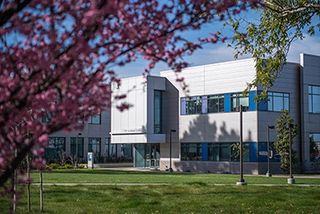When the pandemic hit and higher education shifted to remote learning, educators were concerned about keeping students engaged and motivated. The leaders at Allan Hancock College (AHC) in Santa Maria, Calif., were especially worried, given that the majority of their students are not just first-generation college goers but first-generation high school students, too.
Serving students who are from underrepresented backgrounds is a challenge, especially because many do not have reliable internet access or devices. For these students, the college offered mobile hotspots, laptop-lending programs, and resumed evening remote hours to assist anyone who was not available during normal business hours. The college also offered bilingual assistance and held student town halls via Zoom in both English and Spanish. Students learned about these resources and free and low-cost internet options through the AHC website and via emails and postcard mailings.
“When COVID hit, we were halfway into the semester and it was important to make sure we continued to provide high-level interaction for our students,” says Nohemy Ornelas, vice president, student services.
The college had recently begun using Cranium Café, a meeting and collaboration platform from ConexED designed for higher ed to schedule appointments, conduct video meetings, chat online, and more.
“Only a few of us had tested it,” says Andy Specht, director of IT services. “But when we realized that we’d be going remote, the instructional technology team suggested using it more extensively.”
Implementation took less than a week. “It was a very smooth process,” says Specht. “Since it connected to our learning management system, we had no accounts to create.”
The goal was to help students stay connected with academic counseling, financial aid, admissions, tutorial services, and programs for special populations. “We wanted the transition from face-to-face to virtual to be as easy as it could be,” says Ornelas. “No barriers!”
Adding resources
To access the Cranium Café, students go to the college portal, click Cranium Café, and a student support directory appears. Staff and faculty were trained on how to set up and use the various features, and more than 100 created profiles. Some use the platform to list their role and office hours; others use it to hold small-group classes and chat sessions. For staff that conduct virtual meetings, a waiting-room feature lets them know if a student is in the queue.
To encourage people to use the platform, AHC cross-trained support staff in many areas to be able to assist students holistically, eliminating the additional steps needed to reach another department. Staff members communicated with one another daily to make sure that they were meeting the individual needs of students.
“We faced several challenges with the transition to remote learning,” says Ornelas. “It was a difficult time for students and staff as there was a need to convert courses and services to continue to provide a space to learn and support students’ educational goals.”
Although AHC’s’s operating hours stayed the same, evening sessions and presentations were offered throughout the day to accommodate working families and students. The college also created resources to support students and faculty, including a COVID-19 webpage, town halls hosted by AHC’s President, videos, and webinars. The videos covered essential topics such as registration, mental health services, and support for students with disabilities.
“We worked with information technology and technology support to ensure that the various areas had access to create accounts and get support in the Cranium Cafe,” says Ornelas. Webinars and instructions were posted on how to set up logins and passwords.
“We promoted the Cranium Café to our staff and faculty, and many use it to get their questions answered too,” says Ornelas. “If I need to get hold of someone in the STEM center or library, I can go to the Café and see who’s immediately available.”
Meeting student needs
Overall, usage has been high throughout the pandemic. During one four-week window, the Launch to College program—part of AHC’s Promise program that offers the first year at AHC free—received more than 1,000 contacts through Cranium Café.
Since students interested in Launch to College would not be able to visit AHC during the pandemic, the college hosted a virtual “Launch of College” and invited interested students to attend. As of today, the college has more than 1,200 Promise students and will offer more Launch to College events in late July and early August.
“Best of all, we now have multiple ways to reach out and meet our students’ different needs, and that has been really helpful,” says Ornelas.

